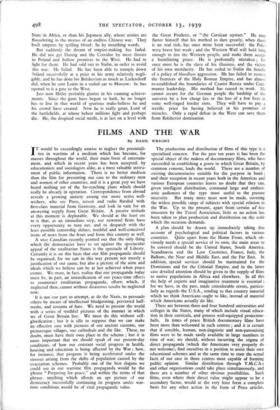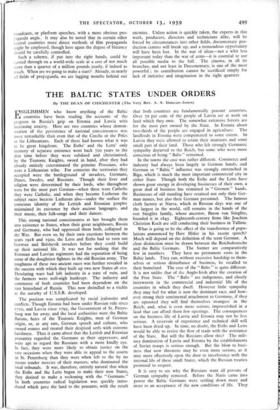FILMS AND THE WAR
By BASIL WRIGHT
IT would be exceedingly unwise to neglect the potentiali- ties in wartime of a medium which has become, for masses throughout the world, their main form of entertain- ment, and which in recent years has been accepted, by educationists and sociologists alike, as a most valuable instru- ment of public information. There is no better medium than the film for presenting our case to the ordinary men and women of other countries, and it is a great pity we have heard nothing yet of the far-reaching plans which should really be already in operation. Correspondence from abroad reveals a growing anxiety among our more active well- wishers, who see Press, screen and radio flooded with first-class material from Germany, and look in vain for an answering supply from Great Britain. A passive attitude at this moment is deplorable. We should at the least see to it that, as an immediate step, our newsreel firms have every opportunity to turn out, and to despatch with the least possible censorship delays, truthful and well-conceived items of news from the front and from this country as well.
A wise Canadian recently pointed out that the only thing which the democracies have to set against the spectacular appeal of the totalitarian States is the spectacle of Liberty. Certainly it is on this basis that our film propaganda should be organised, for we can in this way present not merely a justification of our cause, but also a picture of the aims and ideals which we believe can be at last achieved when peace comes. We must, in fact, realise that our propaganda today must be, in part, an intensification of our peace-time efforts to counteract totalitarian propaganda, efforts which, if neglected then, cannot without disastrous results be neglected now.
It is not our part to attempt, as do the Nazis, to persuade others by means of intellectual bludgeoning, perverted half- truths, and screams of hate. We need to present the world with a series of truthful pictures of the manner in which we of Great Britain live. We must do this without self- glorification ; but it is idle to suppose that we can make an effective case with pictures of our ancient customs, our picturesque villages, our cathedrals and the like. These, no doubt, must have their own place in the scheme ; but it is more important that we should speak of our present-day conditions, of how our constant social progress in health, housing and education is being affected by the War ; how, for instance, that progress is being accelerated under the stresses arising from the shifts of population caused by the evacuation schemes. Probably one of the best slogans we could use in our wartime film propaganda would be the phrase "Preparing for peace," and within the terms of that phrase, anything which affords an apt picture of our democracy successfully continuing its progress under war- time conditions would be of vital propaganda value. The production and distribution of films of this type is a specialised concern. For the past ten years it has been the special object of the makers of documentary films, who have succeeded in establishing a genre in which Great Britain, by common consent, leads the world. There are a number of existing documentaries suitable for the purpose in hand ; and their reception in recent years both in the Americas and various European countries leaves no doubt that they can, given intelligent distribution, command large and enthusi- astic audiences of the type most useful to the present necessity. But many more must now be made, covering the widest possible range of subjects with special relation to the War. Up to the present, apart from certain act hoc measures by the Travel Association, little or no action has been taken to plan production and distribution on the scale which the occasion demands.
A plan should be drawn up immediately taking due account of psychological and political factors in various countries. Quite apart from the Home Front, which ob- viously needs a special service of its own, the main areas to be covered should be the United States, South America, Scandinavia and the Low Countries, France, Italy, the Balkans, the Near and Middle East, and the Far East. In addition, special services should' be maintained for the Dominions and for the Colonial Empire, and in the latter case detailed attention should be given to the supply of films to native populations in Africa and elsewhere. In all this the help of experts and imaginative treatment is essential ; for we have, in the past, made considerable errors, particu- larly as regards the U.S.A., sending to that country material which we think Americans ought to like, instead of material which Americans actually do like.
There are between three and four hundred universities and colleges in the States, many of which include visual educa- tion in their curricula, and possess well-equipped projection- halls. In times of peace British documentary films have been more than welcomed in such centres ; and it is certain that if sensible, human, non-jingoistic and non-patronising films were to be made easily available in large numbers in time of war, we should, without incurring the stigma of direct propaganda (which the Americans very properly do not welcome), find ourselves in a position to assist their own educational schemes and at the same time to state the actual facts of our case in those centres most capable of forming public opinion. Similar distribution through Y.M.C.A.s and other organisations could take place simultaneously, and there are a number of other obvious possibilities. Such films, even where their direct value might appear to be a secondary factor, would at the very least form a complete basis for any other action in the form of Press articles, broadcasts, or platform speeches, with a more obvious pro- 7aganda angle. It may also be noted that in certain other neutral countries more direct methods of film propaganda might be employed, though here again the degree of blatancy should be carefully controlled.
Such a scheme, if put into the right hands, could be carried through on a world-wide scale at a cost of not much more than a quarter of a million pounds yearly, if indeed as much. When are we going to make a start? Already, in nearly all fields of propaganda, we are lagging months behind our enemies. Unless action is quickly taken, the experts in this work, producers, directors and technicians alike, will be forced by circumstances into other fields, documentary pro- duction centres will break up, and a tremendous opportunity will have been lost. In the war of ideas—not a whit less important today than the war of arms—it is essential to use all possible media to the full. The cinema, in all its branches, and not least in Documentary, is one of the most powerful ; its contribution cannot be sacrificed simply for lack of initiative and imagination in the right quarters.











































 Previous page
Previous page